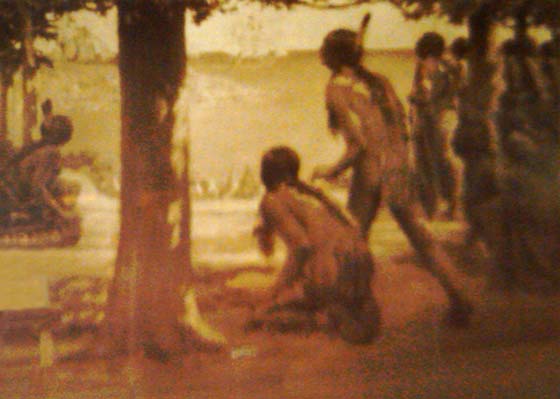‘The Head in Edward Nugent’s Hand: Roanoke’s Forgotten Indians’
By Tanya Lee
Later, the Algonquins would ask the English to share that power and save their people. The English, from the Algonquin point of view, refused, and the Algonquins came to see that the English used disease as a weapon. This same series of epidemics also brought into question the efficacy of the Algonquins’ shamans, powerless to stop the disease, creating yet more social and religious uncertainty in already challenged communities.
Imagine a shipload of plague carriers was moving into your neighborhood. Would you be justified in taking extraordinary steps to keep them out and protect your family? Yes. If all else failed, would you be justified in killing them in self-defense? Yes. Even the "innocent" women and children? Yes. (The Indians may have noticed the weaker women and children were more likely to be sick.)
This is all the justification the Indians needed for many of their so-called massacres. Not only were the colonizers armed with muskets and cannons, they were carrying an invisible weapon: disease. A European landing party was akin to the launch of a biological WMD.
Massacres = justified response
Let's recall what actually happened. For the most part, the Indians treated the first colonizers as welcome guests. They helped and traded with the newcomers as long as they were friendly. When the Europeans continued expanding their settlements, the Indians grudgingly gave way. They started killing people only when the Europeans pushed beyond their established boundaries into Indian territory.
One could argue that they were much more tolerant than they should've been. With 20-20 hindsight, they might've attacked every rowboat of Europeans before it landed. Since some of the passengers were akin to "Typhoid Marys," why not?
Though the massacre deaths were regrettable, the Indians had every right to defend themselves from disease. The Europeans had enough experience with colonizing by then. They should've known better than to set foot in a strange land when some of them were sick. By endangering the Indians with their depraved indifference, the Europeans got what they deserved.
For more on the subject, see Genocide by Any Other Name....
Below: "Look...more ships! There's an excellent chance we'll all be dead within six months. Should we a) greet them warmly or b) discourage them from landing? What would they do in our position?"


No comments:
Post a Comment